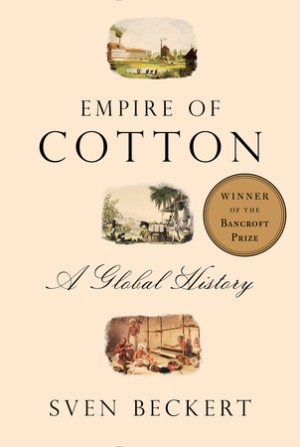
INFO
- Rating: 8
- Author: Sven Beckert
- OpenLibrary
Notes
李天豪就这本书发过两个视频,当时正好也是新疆棉花事件。
书后面有快一半都是注释。尽管如此这本书的正文部分还是很长。
我注意到作者有两个惯用语: hand in hand 和 indeed
- Author tried to answer why industrialization only happened in some states but not the others with unclear results. I guess it’s good to not leave any conclusions hastily. But among many factors, I think the author and I will agree that the main factor is that the people in charge are directly involved and benefited from these cotton manufacturing.
Review
Highlights
Generated by koreader
Chapter 5: Slavery Takes Command
Page 133 @ 04 February 2024 12:35:30 AMinnovations in labor control
Chapter 6: Industrial Capitalism Takes Wing
Page 307 @ 06 February 2024 07:26:08 AMcapacity of states to foster a domestic cotton industry turns out to be the key division between places that industrialized and those that did not
what is new in these modern states?
Page 309 @ 06 February 2024 07:30:37 AMYet monopolies, subsidies, and the provision of expertise all proved to be fairly minor interventions, sufficient to allow the building of one factory or another, but not enough to embark upon the creation of a significant domestic cotton industry
old states can do the same but they did not.
Page 310 @ 06 February 2024 07:33:20 AMblockade of British trade, from November 1806 to April 1814, provided the single most important impetus for continental European cotton industrialization, protecting
Page 295 @ 06 February 2024 09:50:17 PMbut that tariff, and along with it the industry,
sounds like forced by warfare
Page 296 @ 06 February 2024 09:54:22 PMslavery demanded low tariffs to facilitate the flow of sugar and coffee from Brazil into global markets and thus precluded the kind of protectionism that had enabled European, North American, and for a time Egyptian industrialization:
confused. is tariff both way the same rate?
Page 297 @ 06 February 2024 10:01:29 PMsaw “industry and agriculture…as rivals for available labor
while in England, farmers got replaced by sheep? 圈地运动?
Page 297 @ 06 February 2024 10:04:39 PMIt was thus not just the capacity of states that explains the spread of cotton manufacturing, but also the distribution of power within them.
who rules determine the result
Page 298 @ 06 February 2024 10:07:21 PMand did not force white yeoman farmers into wage work (unlike, say, in New England and the Black Forest).
Page 301 @ 06 February 2024 10:26:40 PMFrom the 1860s on, capital backed by state power rather than masters backed by expropriation and private physical coercion, would colonize territories and people
Chapter 7: Mobilizing Industrial Labor
Page 326 @ 07 February 2024 09:29:54 PM
Sociologist Jack Goldstone even argues that the different roles of women explain why Europe industrialized and China did not.
before Mao
Page 332 @ 07 February 2024 09:58:00 PM
But machine breaking only became truly prevalent in the 1810s, a moment when the state was able and willing to use
in future, conflict between men and robots are also likely
Chapter 11: Destructions
Page 531 @ 11 February 2024 02:34:24 PM
Lower transaction costs meant lower profits for people invested in the cotton trade, giving a premium to those able to secure a vastly increased quantity of goods.
Page 532 @ 11 February 2024 02:36:04 PM
but now “futures” took off to become the dominant mode of the global cotton trade
Chapter 14: The Weave and the Weft: An Epilogue
Page 711 @ 14 February 2024 01:30:17 PM
The seeds for these plants are more expensive to buy and maintain, but they are also far more productive, thus pushing costs up at the same time that they push cotton prices down
Page 713 @ 14 February 2024 01:31:37 PM
“great leaps” forward.
sarcasms
Page 714 @ 14 February 2024 01:36:34 PM
After the war, government control continued, and to the great lament of the Liverpool Cotton Association, the government’s Raw Cotton Commission remained the sole purchaser and distributor of cotton in Britain.
Page 722 @ 14 February 2024 01:50:44 PM
As part of the settlement, the U.S. government now also supports the Brazilian cotton economy, at a rate of $147.3 million a year.
hilarious
Page 728 @ 14 February 2024 02:08:24 PM
to create a society that serves the needs of all the world’s people—an empire of cotton that is not only productive, but also just.
I wish this too